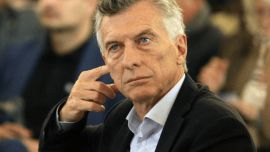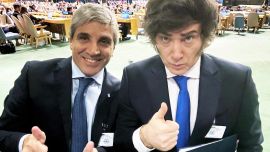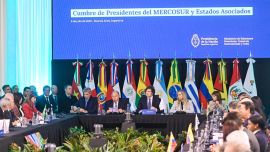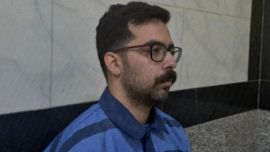In mid-2016, during the Pacific Alliance summit in Puerto Varas, Chile, this columnist was witness to the first meeting between two businessmen who have evolved into politicians. They were Mauricio Macri, then just in the seventh month of his presidency, and Pedro Pablo Kuczynski (PPK), the president-elect of Peru who was to be inaugurated the following month.
After congratulating the Peruvian, perhaps to break the ice, the Argentine leader observed that the most difficult challenge facing a president was to sustain throughout their term the positive image accompanying the honeymoon of an electoral triumph.
Macri was doubtless thinking of Ollanta Humala, the outgoing Peruvian president who then had a negative rating of around 80 percent, or Brazil’s Dilma Rousseff, whose figure hovered around 70 percent.
Nobody was calculating that Rousseff would be ousted via impeachment only two months later, or that Humala and his wife, Nadine Heredia, would go to jail the following year, accused of corruption. And still less that PPK would be this week facing the prospect of impeachment for “permanent moral incapacity,” after it was disclosed that he had apparently hidden decades-long business ties with Brazil’s Odebrecht.
The construction giant has been the hangman for a ring of former Latin American presidents and veeps, all of them indicted for corruption: Brazilian Lula da Silva, the aforementioned Ollanta Humala and Alejandro Toledo of Peru,
Panama’s Ricardo Martinelli and Ecuador’s Vice-President Jorge Glas. In the queue of suspicion and with even more solid accusations than the ones directed against PPK are Juan Manuel Santos of Colombia, Brazil’s Michel Temer, Nicolás Maduro of Venezuela and Panama’s Juan Carlos Varela.
So why have none of the latter succumbed to an impeachment? What keeps them going? Perhaps we should refer back to Macri’s comment to PPK in June, 2016. In reality, Argentina’s president (the son of a construction and auto-industry magnate) was not referring to results and administrative projections when discussing presidential image with his Peruvian colleague, a financier and businessman pampered by Wall Street who has also worked in Argentine multinationals like Techint. He was talking about the more “obscure” numbers of politics, that intangible which sways the social mood. Like that dragging down PPK, who today has scarcely 18 percent approval.
Nevertheless, Macri and Kuczynski are no longer alone as businessmen turned presidents. Last Sunday Chile’s Sebastián Piñera joined the club of centre-right presidents who have their origins in the business sphere. It’s a strange club: all three won in run-offs with a hostile, hard-to-handle Congress elected in the first round. Centre-right triumphs, yes, but ones fraught with weakness.
Is it correct to say that a centre-right wave is sweeping across South America? Perhaps if we extend the metaphor, it would be more accurate to say that though centre-right presidents have certainly been elected, they are confined to surfing from the mere whitewater of the wave while the Congressional opposition dwells in the barrel, struggling to make it toward the breakwater and, eventually, the president’s wipeout.
If we look at Argentina, even after midterm election results favourable to Macri, he still does not enjoy a majority in Congress. His Cambiemos (Let’s Change) caucus has 107 deputies and 24 senators: quorum in the Lower House needs 129 present and 37 in the Senate.
The only way of reaching quorum is crafting alliances with the less aggressive Peronists grouped in Argentina Federal, the faction responding to the governors and the ex-Kirchnerite Diego Bossio. How long will they stay with Macri? Loyalty was never a Peronist virtue.
Let’s return to PPK for now. He won the Peruvian presidency in the second round by a hair (41,000 votes): 50.12 percent as against 49.9 percent for Keiko Fujimori, the daughter of the ex-president jailed for corruption. But in the first round PPK’s party Peruanos por el Kambio (Peruvians for Change) took only 18 seats while Keiko’s Fuerza Popular (Popular Force) won 73 and the Frente Amplio (Broad Front) led by Verónika Mendoza 20.
Mendoza’s Nuevo Perú party later quit the Broad Front coalition and its current leader Marco Arana, together with Keiko’s Fuerza Popular pushed for early elections, calculating that Kuczynski would be ousted after impeachment.
What they did not forsee was that in the night of Thursday, December 21, after 11 hours of debate in Congress, Kenji Funimori – Keiko’s younger brother – would lead 10 of Fuerza Popular lawmakers in abstaining from the vote. Nor that Mendoza’s 10-strong faction would also abstain. Those 20 votes, plus 19 against impeachment, won PPK a repreive, with the opposition, led by Keiko and Arana, falling short by just eight votes out of the 87 needed to force him out.
Funnily enough, it was thanks to the support of the leftist Broad Front that PPK won the presidency in the run-off, and that those same lefties this time out saved this Wall Street’s favourite son from being removed from office.
Let’s move onto Chile. Sebastián Piñera was elected in the second round to a second term with a vote of 54.57 percent, almost 10 percent more than his centre-left rival Alejandro Guillier. But even though he won in 13 of the country’s 15 regions and broke the traditional dominance of the left in the mining north, the Congress elected in the first round belongs to the opposition, just as with Macri and PPK.
Neither in the Upper nor Lower House does Piñera command a majority. His party Chile Vamos has 73 deputies; Nueva Mayoría (Guillier) 43; Frente Amplio (students and the left) 20, Convergencia Democrática (the Christian Democrats) 13 and six others in minority parties. In the Upper House 19 senators respond to Piñera, 15 to Nueva Mayoría while six are Christian Democrats and three in smaller parties.
Will Piñera be able to govern in a climate of “grieta” with student defiance in the streets? The pundits trust in the presidential experience of the ex-owner of LAN airline (with his personal fortune assessed at US$2.5 billion by Forbes) but consider that the success or failure of his second term will depend on whether the opposition reaches agreement or not. That remains to be seen as from March when his second term begins.
Meanwhile, a Congress dominated by the forces of Keiko Fujimori (herself also accused of corruption in connection with the actions of Odebrecht), holds the future of PPK and Peru in its hands.
In Argentina, some opposition congressmen, whose parties did not win a majority in the midterm elections, were allegedly behind the fury unleashed in the streets this December. However, Mauricio Macri could eventually be able to handle Congress if his temporary friends in Peronist circles remain loyal. What he is evidently not handling is the social mood: citizens have started protesting with potbanging rallies. They are not as loud as the ones that faced the previous administration but Macri’s approval ratings are sliding down. Let us hope that what he told PPK in Chile 18 months ago was not a self-fulfilling prophesy.























Comments